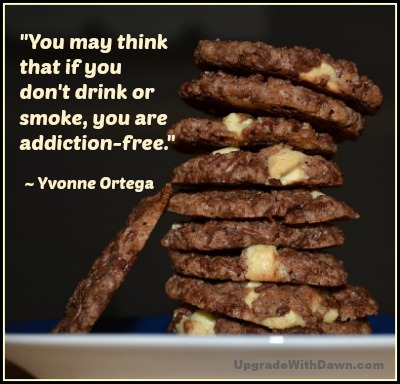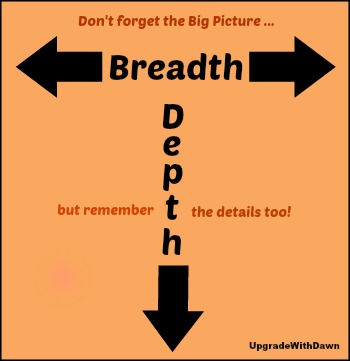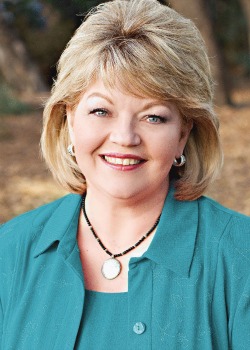Are You Really Addiction-free?
Surviving and thriving after numerous trials, Yvonne Ortega speaks words of wisdom to women who hurt and struggle. In this "Choices" UPGRADE, she encourages women to break free from their  addictions.
addictions.
Yvonne asks, “When you think about addiction, do you imagine a drunk person, who slurs his words, stumbles, and smells of alcohol? Perhaps you visualize a drug addict in a questionable neighborhood selling family possessions to buy illegal drugs."
Because I (Dawn) have faced few "addictions" of my own—like obsession with food—I know addictions can overwhelm anyone. But I also know from experience: we can break free!
There truly is hope!
Yvonne continues . . .
You may think that if you don’t drink or smoke, you are addiction-free.
- However, you may be addicted to food, such as sugar.
Can you make a meal out of candy, cookies or cake? Do you stop at the store, buy a half-gallon of ice cream, and eat it in one sitting? You may be obese. You eat when you worry, get bored, or can’t cope with grief or some other pain. Rather than talk with a trusted friend, mentor, or counselor, you eat.
Philippians 3:19 addresses this problem and says, “Their god is their stomach” (NIV).
- Perhaps you go shopping to cope.
Your father verbally, physically or sexually abused you as a child. You held in the anger and pain of that abuse, but turned to shopping to cope. Now if someone hurts you, you go shopping.
Until you face that pain, you will stay addicted to shopping.
- Maybe you’re a slave to perfectionism.
If you invite guests to your home, your house will be in perfect order inside and out. You’ll probably clean the windows too. You’ll serve a homemade meal and wear the perfect outfit and have every hair in place.
Your addiction to perfectionism won’t allow you to relax, enjoy your guests, or life for that matter.
- If you choose unhealthy relationships, you might date an alcoholic, a batterer, or a gambler.
As one woman said, “My boyfriend doesn’t have a job, but he has a motorcycle. He’s exciting.” As she talked about the different men she dated, she said, “My parents never liked any of them, but they were fun—even the one who ruined my credit.”
She was addicted to unhealthy men and wanted to help them. She needed help to improve her self-confidence.
How can you BREAK FREE from addiction?
1. Admit that you use an escape mechanism to avoid reality.
James 5:16 says, “Therefore confess your sins to each other and pray for each other so that you may be healed. The prayer of a righteous person is powerful and effective.”
It’s not enough to admit the addiction to yourself.
Do so to a pastor, a Christian counselor, or to a Christian recovery group. Confession and prayer will help you.
2. Establish accountability.
The devil wants you crippled with guilt, shame, and secrecy.
Psalm 34:5 says, “Those who look to him are radiant; their faces are never covered with shame” (NIV).
When you meet weekly with your pastor or counselor, you set up accountability. This is comparable to a sponsor in a 12-step group.
3. Know who you are in Christ.
Find Bible verses about your identity in Christ, such as Ephesians 2:10 (NIV):
“For we are God’s handiwork, created in Christ Jesus to do good works, which God prepared in advance for us to do.”
Each day repeat those verses often.
Once you believe with your heart and soul who you are, the relief from addiction won’t entice you.
What will you do this week to break free from addiction?
Yvonne Ortega is a licensed professional counselor, a bilingual professional speaker, and the author of Moving from Broken to Beautiful® through Forgiveness, Moving from Broken to Beautiful: 9 Life Lessons to Help You Move Forward (both in paperback,
of Moving from Broken to Beautiful® through Forgiveness, Moving from Broken to Beautiful: 9 Life Lessons to Help You Move Forward (both in paperback,  Kindle) and Finding Hope for Your Journey through Breast Cancer (Kindle), all available at amazon.com/books. She not only survived but thrived after a domestic violence marriage, breast cancer, and the loss of her only child. With honesty and humor, Yvonne uses personal examples and truths of the Bible to help women move from broken to beautiful. Learn more about Yvonne at her website.
Kindle) and Finding Hope for Your Journey through Breast Cancer (Kindle), all available at amazon.com/books. She not only survived but thrived after a domestic violence marriage, breast cancer, and the loss of her only child. With honesty and humor, Yvonne uses personal examples and truths of the Bible to help women move from broken to beautiful. Learn more about Yvonne at her website.
Graphic adapted, courtesty of TeeTasse, Pixabay.
 Post a Comment → Posted on
Post a Comment → Posted on  Thursday, February 16, 2017 at 9:00AM
Thursday, February 16, 2017 at 9:00AM  Accountability,
Accountability,  Addictions,
Addictions,  Break free,
Break free,  Break free from addiction,
Break free from addiction,  Identity in Christ,
Identity in Christ,  Upgrade with Dawn,
Upgrade with Dawn,  Yvonne Ortega Upgrade Your Life
Yvonne Ortega Upgrade Your Life  Choices,
Choices,  In Christ,
In Christ,  Self-Care
Self-Care 






